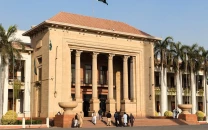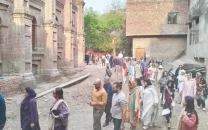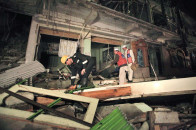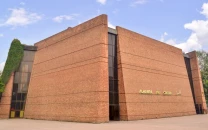SAFMA conference: Academics, media bigwigs call for objective journalism
Urge channels to run programmes that encourage citizens to vote and raise political awareness.

SAFMA conference: Academics, media bigwigs call for objective journalism
Top academicians and media practitioners agreed unanimously at a conference here on Saturday that the media should play a proactive role in strengthening democracy and creating political awareness among the masses.
The participants debated the media’s role in the run up to, and during the upcoming general elections and how militancy or the threat of terrorism could affect the coverage of the elections, at the 5th National Conference organised by the South Asian Free Media Association (Safma).
They also underlined the importance of freedom of expression, an independent media and providing security to journalists to fulfill their professional responsibility with objectivity.
Most of the participants also questioned the role of TV channels in creating hype, fear and sensationalism. “The media must differentiate between news and propaganda,” said Dr Tauseef Ahmed Khan, a professor of mass communication at the Federal Urdu University, Karachi.
Dr Khan said it was a matter of great concern that Pakistan has the lowest voter turnout in South Asia. “This makes our governments weak.” He urged the media to run programmes that encourage citizens to vote and help them make an informed choice. He noted that there was a great need to train journalists on how to cover elections in a nonpartisan manner.
Dr Mohammed Waseem, a professor at the Lahore University of Management Sciences, urged the media to ‘sell democracy’ by focusing more on policy and manifestos of political parties, instead of individual leaders. He asked the media to not just report on society’s wrongdoings, but also to suggest solutions. Dr Waseem criticised the political parties for mobilising only male voters, “Knowing that the women will do as the men tell them.”
Owais Touhid, current affairs director of ARY, however, said that the media was not supposed to be reformist. “The media reflects society,” he said, highlighting its role in the 2008 elections, hoping that it would play an even bigger role in the next general elections.
Mazhar Abbas and Ayaz Khan of the Express Media Group, were sceptical. Abbas said the media was neither free nor independent. “In the past, governments have twisted the arms of the media and now commercialism and business tycoons are influencing it. I do not foresee fair polls,” he lamented.
The conference also condemned the Taliban attack on education activist Malala Yousafzai and her friends Shazia Ramzan and Kainat Riaz. It said that those who attacked them must be brought to justice, and those who were trying to cover or justify terrorist activities were equally to blame.
The participants also demanded reforms in the Pakistan Electronic Media Regulatory Authority, the Press Council of Pakistan, Pakistan Broadcasting Corporation and PTV.
Published in The Express Tribune, October 21st, 2012.



















COMMENTS
Comments are moderated and generally will be posted if they are on-topic and not abusive.
For more information, please see our Comments FAQ